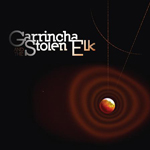|
|
 |
Dusted Reviews
Artist: Garrincha and the Stolen Elk Album: Void Label: Weird Forest Review date: Aug. 19, 2011 |

|
|
|
 |
Garrincha and the Stolen Elk’s music isn’t much easier to explain than their name. The duo, Matt Kretzmann and Weird Forest proprietor Davy Bui, might be fans of vintage Brazilian futebol, but that doesn’t account for the pilfered deer. Void, the pair’s debut full-length, is a similarly mysterious mash-up. Like a slow-moving river through an industrial wasteland, the music picks up all manner of detritus as it moves along, its ingredients even more unpredictable than its course. Void is a tough album to sink into, a conglomeration of disparate parts and rocky conveyances, atmospheres surreptitiously built and abruptly scuttled. It’s an arcane construction masquerading as a junk pile, its logic as tough to decipher as its language.
It’s tempting to say that G+SE (as the duo call themselves in shorthand) speak a language of their own, a musical idioglossia made for two. But Void is not so much the product of a private tongue as it is a conglomeration of scavenged phrases and repurposed forms. “Tower of Babble” evokes the biblical tale of the confusion of tongues, that point at which a single language became many, and Void echoes this dispersal of dialects in both its overall composition and individual components. Though Bui and Kretzmann make frequent use of the vocalized word, it’s as another sound rather than a vehicle for meaning, its content obscured or untranslated. On “Tower of Babble,” snippets of German are run over by guitar and organ tones so that the rhythms and fluctuations of the phrase are the focus, not what is said. Elsewhere, voices in song are slowed down until they become a monolithic sludge, individual phonemes lost to the greater whole, and the likely unwitting participants in a field recording of an Asian religious ceremony are presented as an indistinguishable mass, the content of their worship lost as a result of fidelity and manipulation. Even when G+SE sing, their lyrics are hard to discern, sung indistinctly and pushed toward the back of the mix. “I Don’t Believe You” samples various snippets of its titular phrase in the album’s most direct and understandable linguistic delivery, but while the meaning of the phrase is clear, there’s little communicated in its rapid-fire repetition. These reappropriated words are simply building blocks amid a collection of sundry others, yet another sound in Bui and Kretzman’s arsenal.
Void‘s form is as obtuse as its language. The music is liable to make unexpected movements and G+SE’s (mostly) two-man orchestra of instruments and pre-recorded sound is liable to shrug off predictability at every pass. There’s no knowing whether a crescendo, forming like an avalanche as it picks up whatever lies in its path, will culminate in a satisfying release of energy or simply die away, or when a track’s ambience, carefully crafted, will be suddenly cast against the rocks. A gnarly notion of psychedelic catharsis informs the evolution of each composition, with G+SE tending to steer things toward some sort of energetic denouement. The three tracks that make up “First Rites, Last Communion” move at a slower pace than the pair that precede them, the aforementioned field recordings inviting a tone of meditative contemplation that is toyed with and put through the wringer before the guitar coaxes things into a climax that briskly fades away in advance of the album’s quiet conclusion. Bui and Kretzmann seem comfortable with some level of self-frustration, their own movements toward linearity or a sustained atmosphere foiled by a drop-in from an unexpected (and often incongruous) voice, or even a sudden full stop.
Sometimes, G+SE can’t leave well enough alone. Like the chef who can’t resist adding another dash of this or that, or the painter who can’t seem to decide when one more brush stroke is one too many, Kretzmann and Bui are sometimes active to a fault. Some of the simplest segments of Void are its strongest, but those same segments are frustratingly brief. Whatever its faults, this is one album that’s not missing a little something. In fact, fewer little somethings might’ve done Void a great deal of good.
By Adam Strohm
|







